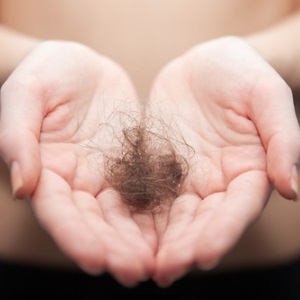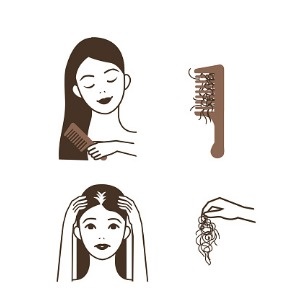
Doctors say that emotional stress could disturb the hair's cycle, causing the follicles to stop growing and enter a "resting phase".
What is alopecia areata?
It’s an autoimmune disease, which means it causes the body to attack itself. In this case, the immune system targets the hair follicles.
Experts believe cells called T-lymphocytes converge around the follicles and combine with molecules in the hair, causing an infection that makes the hair fall out. "The reason this happens remains a mystery," says dermatologist, Dr Marianne Duvenage.
Genetics could play a role. Alopecia areata sufferers are more likely to have family members who have either alopecia or another autoimmune disease.
“Alopecia” means hair loss and “areata” means round and spotty. The hair falls out in various areas, which are completely smooth and hairless although the scalp itself looks normal.
There are various forms of the condition:
• Diffuse alopecia areata: the hair doesn't fallout in patches but so much is lost that the hair looks sparse.
• Alopecia areata barbae: the condition affects only the beard.
• Alopecia areata totalis: all the hair on the head is lost.
• Alopecia areata universalis: all body hair is lost, from eyebrow and underarm to leg and pubic hair.
How is alopecia areata treated?
“Larger bald patches can be treated with external cortisone cream or even cortisone injections. If your head is 30 to 100 percent bald, you should preferably be under the care of a specialist because you usually need to take cortisone tablets. Your doctor must discuss in detail the risks and advantages of this medication with you," says Dr Duvenage.
In most cases, the medication is effective only while you’re taking it.
No treatments for extensive alopecia are regarded as permanently safe or successful. Sometimes, chemical remedies on the skin cause an allergic reaction and the increased blood flow stimulates hair growth. "Long-term use of cortisone can have side-effects, like thinning skin, bleeding under the skin, stretchmarks, weakened bones, recurring infections, diabetes and even depression," says Dr Duvenage.
Will your hair grow back?
There are no statistics but Dr Duvenage estimates fewer than half of all alopecia patients are treated successfully. When the hair falls out in only a few small patches, it may grow back naturally in a few months to a year, but extensive alopecia areata seldom recovers spontaneously. Larger patches can progress to alopecia areata totalis and in rare cases, to alopecia areata universalis.
Sometimes the hair grows back only to fall out again later. If the back of the head is affected, the chances of recovery are particularly poor. Alopecia can cause high levels of stress and anxiety, even depression. Professional psychological counselling is helpful. Wearing a wig can also help you to feel more confident.
But ultimately, says Dr Duvenage, you will have to accept your alopecia and learn to live with it.




 Publications
Publications
 Partners
Partners












